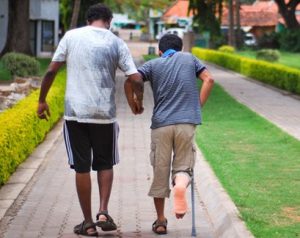There are perhaps hundreds of thousands of people in America who think about Covid on a regular basis.
Some of those people lost loved ones during that pandemic, and Covid was either a contributing factor or the reason. Some contracted the virus and are still suffering from after-effects. Parosmia, the inability of the brain to correctly identify smell, became much more wide spread because of Covid.
That may end up being a blessing, because more research will be done and cures will be discovered. For now, though, a chef who can no longer cook professionally deals with it, and so do others.
Recently a friend and I were having breakfast at a restaurant, and our server was wearing a mask. My friend asked if she would pull it down briefly so he could see her smile, and she declined.
I asked if she was ill or worried about spreading an illness, and she said no. Her reason for wearing the mask was preventive. She didn’t want to catch Covid.
I told her I’d read that the function of masks was more for what is going out than for what is coming in. While she was a little surprised by that, she said, “I’m more comfortable with it on.” That was the end of our mask conversation. And, it turned out, our time with her. She asked her manager to serve us, which he did.
Yesterday I ran into another friend who said he and his wife had just returned from a cruise, where they had both caught Covid. He said he heard that wasn’t unusual on ocean or river cruises, even now.
But I almost never think about Covid. Without some external reminder, it has too much to fight through in my mind to get anywhere near the part I call “conscious thought.”
What I do think about a lot is the contagion of good.
The need for a mask
The most common purpose of a mask, to put it in the most positive terms, is protection.
 If the wearer is committing a crime, it is to protect his or her identity from being revealed. A hockey goalie wears a mask to prevent injury. Our server in that restaurant was, she honestly believed, protecting her own health.
If the wearer is committing a crime, it is to protect his or her identity from being revealed. A hockey goalie wears a mask to prevent injury. Our server in that restaurant was, she honestly believed, protecting her own health.
Going down one more level, protection in most cases is based on fear. That fear may or may not be rational, but it is almost always emotional.
The relationship between masks and fear goes deep, and perhaps one day I’ll write about that. For now, let me encourage you to take off your metaphorical masks and in the process do two things.
First, face the fear. The more you let fear hold on to you, the bigger it seems to get. I understand that empirically, which means, “been there, done that.” Again, more to write later. But the fear you have, even well founded fear, will never leave until you face it.
Second, spread the joy. A brief smile from the server we had would have been a joy for us. And knowing us, her tip would have been a joy for her. Of course it isn’t always medical masks blocking the spread of joy — a mask of pride can do that too.
Good is contagious
 Captain Ernest Gordon was a prisoner of war during World War II. A Scotsman, he was a company commander with the Argyll and Sutherland Highlanders. When he was captured by the Japanese, he was interred and subjected to forced labor. His particular camp was featured in a famous movie called The Bridge On The River Kwai.
Captain Ernest Gordon was a prisoner of war during World War II. A Scotsman, he was a company commander with the Argyll and Sutherland Highlanders. When he was captured by the Japanese, he was interred and subjected to forced labor. His particular camp was featured in a famous movie called The Bridge On The River Kwai.
It is also known as The Death Railway, because more than 13,000 prisoners of war died working on it, along with many more thousands of southeast Asians forced into labor there.
The Culture Trip says this about it:
Even those [prisoners of war] who overcame the odds had to endure abysmal living and working conditions, including a humid, monsoon-plagued climate ripe for spreading diseases, food shortages, an absence of medical care, and the mammoth task of construction on unforgivable terrain and with primitive equipment. That’s not to mention the incredible violence and torture inflicted by the Japanese and Korean soldiers supervising the construction.
Captain Gordon was so ill he was not expected to live and was moved into the death quarters of the camp. His roommates were corpses, or men soon to be corpses. He had diphtheria, was starving, and his thigh was now the size his healthy wrist had been. He was ready to die.
Then one day two new prisoners were assigned to the camp. Dusty Miller and Dinty Moore cared for Gordon. They cleaned his sores, massaged his legs, and gave him his first bath in six weeks.
Dignity began to return to Gordon, and the goodness of Miller and Moore also spread to him. He began to treat other prisoners, and the good became contagious even beyond those three. A place where prisoners had stolen from each other turned into a place where they shared what they had.
In his autobiography, Gordon said the whole atmosphere among the prisoners lightened. Circumstances had not changed, but they had. Masks of hatred and bitterness and fear were removed, and compassionate faces were now seen.
The best business tip ever?
Recently Inc. magazine published This May Be the Best Business (and Life) Tip You Will Hear Today. It all boiled down to one short sentence:
“Choose to surround yourself with people who are smarter and better than you.”
 The article goes on to say, “We tend to adopt the habits and mindset of those with whom we spend the most time.” You probably already knew that.
The article goes on to say, “We tend to adopt the habits and mindset of those with whom we spend the most time.” You probably already knew that.
Want to play better golf? Play with better players. Want to be a better leader? Find a great leader to follow.
You can be that better person, and you will be every time you do good. Others will see it, and they may just catch it.
Good is amazingly contagious. Go out and spread it!
Take off your mask — be contagious for good.
There are perhaps hundreds of thousands of people in America who think about Covid on a regular basis.
Some of those people lost loved ones during that pandemic, and Covid was either a contributing factor or the reason. Some contracted the virus and are still suffering from after-effects. Parosmia, the inability of the brain to correctly identify smell, became much more wide spread because of Covid.
That may end up being a blessing, because more research will be done and cures will be discovered. For now, though, a chef who can no longer cook professionally deals with it, and so do others.
Recently a friend and I were having breakfast at a restaurant, and our server was wearing a mask. My friend asked if she would pull it down briefly so he could see her smile, and she declined.
I asked if she was ill or worried about spreading an illness, and she said no. Her reason for wearing the mask was preventive. She didn’t want to catch Covid.
I told her I’d read that the function of masks was more for what is going out than for what is coming in. While she was a little surprised by that, she said, “I’m more comfortable with it on.” That was the end of our mask conversation. And, it turned out, our time with her. She asked her manager to serve us, which he did.
Yesterday I ran into another friend who said he and his wife had just returned from a cruise, where they had both caught Covid. He said he heard that wasn’t unusual on ocean or river cruises, even now.
But I almost never think about Covid. Without some external reminder, it has too much to fight through in my mind to get anywhere near the part I call “conscious thought.”
What I do think about a lot is the contagion of good.
The need for a mask
The most common purpose of a mask, to put it in the most positive terms, is protection.
Going down one more level, protection in most cases is based on fear. That fear may or may not be rational, but it is almost always emotional.
The relationship between masks and fear goes deep, and perhaps one day I’ll write about that. For now, let me encourage you to take off your metaphorical masks and in the process do two things.
First, face the fear. The more you let fear hold on to you, the bigger it seems to get. I understand that empirically, which means, “been there, done that.” Again, more to write later. But the fear you have, even well founded fear, will never leave until you face it.
Second, spread the joy. A brief smile from the server we had would have been a joy for us. And knowing us, her tip would have been a joy for her. Of course it isn’t always medical masks blocking the spread of joy — a mask of pride can do that too.
Good is contagious
It is also known as The Death Railway, because more than 13,000 prisoners of war died working on it, along with many more thousands of southeast Asians forced into labor there.
The Culture Trip says this about it:
Captain Gordon was so ill he was not expected to live and was moved into the death quarters of the camp. His roommates were corpses, or men soon to be corpses. He had diphtheria, was starving, and his thigh was now the size his healthy wrist had been. He was ready to die.
Then one day two new prisoners were assigned to the camp. Dusty Miller and Dinty Moore cared for Gordon. They cleaned his sores, massaged his legs, and gave him his first bath in six weeks.
Dignity began to return to Gordon, and the goodness of Miller and Moore also spread to him. He began to treat other prisoners, and the good became contagious even beyond those three. A place where prisoners had stolen from each other turned into a place where they shared what they had.
In his autobiography, Gordon said the whole atmosphere among the prisoners lightened. Circumstances had not changed, but they had. Masks of hatred and bitterness and fear were removed, and compassionate faces were now seen.
The best business tip ever?
Recently Inc. magazine published This May Be the Best Business (and Life) Tip You Will Hear Today. It all boiled down to one short sentence:
“Choose to surround yourself with people who are smarter and better than you.”
Want to play better golf? Play with better players. Want to be a better leader? Find a great leader to follow.
You can be that better person, and you will be every time you do good. Others will see it, and they may just catch it.
Good is amazingly contagious. Go out and spread it!
Get The Do Good U news
We won’t send you spam. Unsubscribe anytime.
Let's Do Some Good
Learn more about our programs.